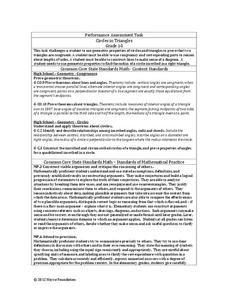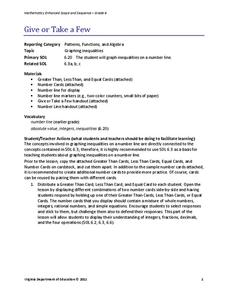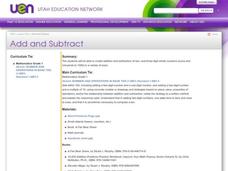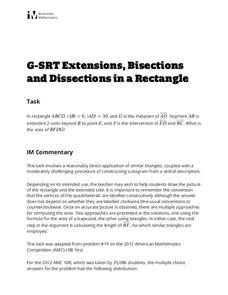Mathematics Assessment Project
Deducting Relationships: Floodlight Shadows
Try to figure out what happens with shadows as a person moves between two light sources. A formative assessment lesson has individuals work on an assessment task based on similar triangles, then groups them based on their...
Arizona Department of Education
Introduction to Integers
Welcome to the backward world of negative numbers. This introductory lesson teaches young mathematicians that negative numbers are simply the opposite of positive numbers as they use number lines to plot and compare...
California Education Partners
Improving Our Schools
Split the work three ways. Learners use their knowledge of fractions to solve problems dealing with splitting up work loads evenly between three groups. Scholars determine the fractional portion of work each group will do along with...
American Statistical Association
You and Michael
Investigate the relationship between height and arm span. Young statisticians measure the heights and arm spans of each class member and create a scatter plot using the data. They draw a line of best fit and use its slope to explain the...
Inside Mathematics
Snakes
Get a line on the snakes. The assessment task requires the class to determine the species of unknown snakes based upon collected data. Individuals analyze two scatter plots and determine the most likely species for five...
Inside Mathematics
Picking Apples
Getting the best pick of the apples depends on where to pick. The short assessment presents a situation in which class members must analyze a real-world situation to determine the cost of picking apples. The pricing structures resemble...
Curated OER
Another Way of Factoring
Focusing on this algebra lesson, learners relate quadratic equations in factored form to their solutions and their graph from a number of different aspects. In some problems, one starts with the original equation and finds the...
Curated OER
Complex numbers in polar form
Students plot complex numbers in the polar plane. They are asked to list what they believe are the five most famous numbers in mathematics. Students are explained that generally accepted that the five most famous numbers in mathematics...
Curated OER
Proofs Of The Pythagorean Theorem?
Even U.S. President James Garfield had his own proof of the Pythagorean Theorem! Pupils consider three different attempts at a geometric proof of the Pythagorean Theorem. They then select the best proof and write paragraphs detailing...
Statistics Education Web
Double Stuffed?
True or false — Double Stuf Oreos always contain twice as much cream as regular Oreos. Scholars first measure the masses of the filling in regular Oreos and Double Stuf Oreos to generate a class set of data. They use hypothesis testing...
Inside Mathematics
Circles in Triangles
Challenge the class with inscribed circles in triangles. The assessment task requests class members use their knowledge of circles and right triangles to prove two triangles are congruent. They go on to utilize their knowledge of...
CCSS Math Activities
Smarter Balanced Sample Items: High School Math – Claim 4
What is the appropriate model? Sample problems show the extent of the Smarter Balanced assessments Claim 4, Modeling and Data Analysis. Items provide pupils the opportunity to use mathematical modeling to arrive at a reasonable answer....
Alabama Learning Exchange
Partying with Two/Three Digit Whole Numbers
Learners practice problem-solving with this addition activity. They plan a party for their class and another class by determining how many cupcakes are needed. Students draw a picture of how they determined the number of cupcakes.
Illustrative Mathematics
Track Practice
And they're off! While two runners are at track practice, your mathematicians' job is to find out who leaves the other in the dust. The activity provides a variety of data that can be computed into unit rates for comparisons. Available...
Virginia Department of Education
Give or Take a Few
Young mathematicians extend their knowledge of rational numbers on a number line to graph inequalities by first using number cards to compare rational numbers. They finish by using similar reasoning to graph inequalities on a number line.
Curated OER
Division Problems with 0 and 1
Students explore beginning division. In this division number properties instructional activity, students solve simple division story problems using cookies. Students create models that represent the identity and zero properties, then...
Curated OER
Add and Subtract
Like the cubs in A Fair Bear to Share, your 2nd grade class will practice adding and subtracting double-digit numbers by grouping, regrouping, and sorting a collection of objects. This requires many resources, but it is well worth the...
Illustrative Mathematics
Extensions, Bisections and Dissections in a Rectangle
Gaining practice in translating a verbal description into a diagram and then an equation is the real point of this similar triangles exercise. Once the diagram is drawn, multiple methods are provided to reach the conclusion. An effective...
American Statistical Association
A Sweet Task
Candy is always an effective motivator! A fun math activity uses M&M's and Skittles to explore two-way frequency tables and conditional probability. The candy can serve a dual purpose as manipulatives and experimental data.
NASA
Understanding the Effects of Differences in Speed—Problem Set D
Fall back and slow down. The fourth lesson in a six-part series on air traffic control leads the class to find the difference in distance traveled based upon the difference in speed. Pupils work through a problem related to walking...
Curated OER
Comparing Fractions
Learners compare three sets of fractions using the greater than, less than, and equal signs. To justify their answers, a drawing is also required that illustrates their reasoning. Including fractions with like and unlike denominators, as...
EngageNY
Prove the Pythagorean Theorem Using Similarity
Amaze your classes with the ability to find side lengths of triangles immediately — they'll all want to know your trick! Learners use the Pythagorean Theorem and special right triangle relationships to find missing side lengths.
Laboratory for Atmospheric and Space Physics
Planetary Distances on the Playground
There's no need to stay inside; get out of the classroom and create a scaled map of the solar system on your playground field! In collaborative groups, scholars identify the distance between the sun and other planets, place planet...
NASA
Pop! Rockets
Off they go — launching rockets is fun. The lesson plan contains templates to build paper rockets that can be launched from a PVC pipe launcher. Individuals or groups build the rockets and determine the shapes for their fins. Included...

























